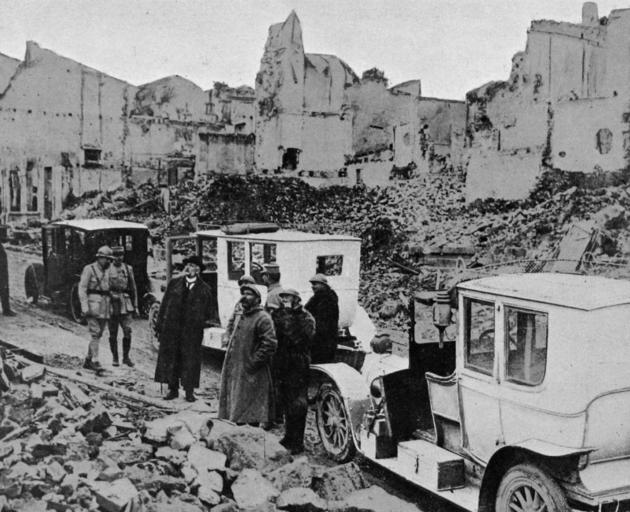
The secretary reported that he had hunted high and low for the volume that contained such a statement, and he is probably still foraging among musty books. In the meantime Mr H. F. Allen, secretary of the Wellington Industrial Association, has unearthed an old publication - namely, the Oracle Encyclopaedia, published by Geo. Newnes (Ltd.), in 1895, and edited by R. W. Egerton Eastwick, B.A., of the Middle Temple.
This tells all about Dunedin, supplying enough detail to suit the most fastidious. Here is the full extract:- ''Dunedin, the capital of the province of Otago, New Zealand, is picturesquely situated at the head of Otago Harbour, an arm of the South Pacific, 14 miles long and at the base and on the slopes of hills.
Dunedin was founded in 1848, and until 1861 was a small and unimportant place. The discovery of rich gold deposits at Gabriel's Gully in that year caused a great influx of population, and Dunedin rapidly rose to the position, which it still holds, of being the foremost commercial town in New Zealand.
In spite of numerous natural difficulties, it is well laid out, containing numerous streets, each 66ft broad, and paved, and lighted with gas. It is well supplied with water from a reservoir. Dunedin is a See of the Anglican and Roman Catholic Churches. It contains a number of fine public and private buildings, and possesses a rising university. Population: Borough, 22,376; suburbs, 23,493.''
•He must have a long spoon that must eat with the devil. The truth of this is probably by this time impressing itself upon the minds of the rulers and people of the United States.
President Wilson has on various occasions thought it desirable to give expression to his feelings of friendship for Germany and he has made no attempt to conceal the pain which it caused him to break off the diplomatic relations between his country and the German Empire.
If he has supposed that the tender regard which he has entertained towards Germany has been reciprocated by the militarist party that controls the destinies of the Fatherland, he must have received a rude awakening to the realities of the case as they have been shown in the disclosure of a German plot that was directed to an effort to seduce Japan from her alliance with the Entente Powers and to associate her with Mexico in an attack upon the United States in event of war between America and Germany.
It was doubtless hoped - though we shall expect to hear, vainly hoped - by Germany that the irritation felt in Japan over the American legislation for the prevention of immigration from the Far East would induce that sensitive nation to incline a favourable ear to such advances as may have been made to her, and the acquiescence of the Mexican bandits in the plot would probably be readily secured if the German agents who were entrusted with the negotiation of the intrigue were sufficiently provided with gold for judicious distribution.
But the plot has seriously miscarried somehow and the disclosure of it seems to have come very opportunely. The effect of it can hardly be other than to excite the indignation of the people of the United States against Germany to a degree that will bring appreciably nearer the entrance of this great republic into the war on behalf of humanity.
•A story that demonstrates the humanity of the individual is told by the parents of a Timaru soldier. Having been severely knocked about at Gallipoli the soldier underwent several operations in Egyptian hospitals, where the eminent British surgeon, Sir Frederick Treves, announced that yet another ordeal was necessary, but was a delicate operation that could be undertaken by only one man that he knew of, mentioning a London specialist.
Despite this pronouncement the man was sent back to New Zealand, where it was proposed to operate, but he preferred to accept Sir Frederick Treves's advice and determined to place himself in the London doctor's hands, even at his own expense, if necessary.
The Government provided him with transport Home, via Egypt, and he consulted the much-sought oracle, who, when asked what his fee would be, declined to accept payment from a New Zealand soldier who had travelled so far to obtain his services, and not only conducted a successful operation, but surrounded the patient with every care and comfort in his own private hospital.
- ODT, 2.3.1917.
COPIES OF PICTURE AVAILABLE FROM ODT FRONT OFFICE, LOWER STUART ST, OR WWW.OTAGOIMAGES.CO.NZ












